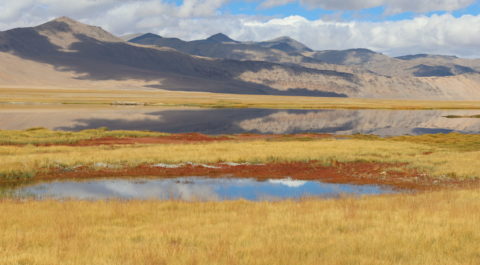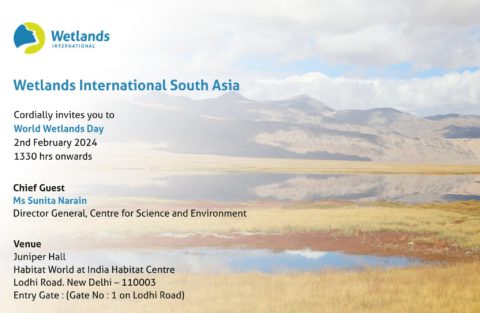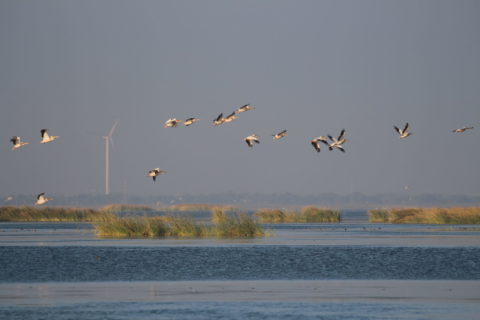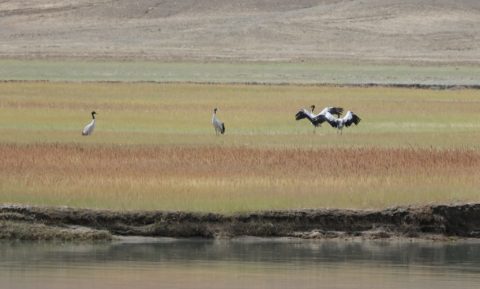
World Wetlands Day to focus on Wetlands and Human wellbeing
-
Capacity development
-
Climate and disaster risks
-
Wetland agriculture and fisheries

February 2nd of each year is observed globally as World Wetlands Day to mark the day of the adoption of the Ramsar Convention in 1971. The Ramsar Convention is an international treaty for the conservation of wetlands. World Wetland Day has been organised since 1995 to raise awareness of the value of wetlands for nature and society. The theme for World Wetlands Day 2024 is ‘Wetlands and human wellbeing.’ This theme spotlights the interconnectedness wetlands have with human life, with people drawing sustenance, inspiration and resilience from these productive ecosystems. Importantly, this theme underscores how all aspects of human well-being are tied to the health of the world’s wetlands and calls on each of us to value and steward our wetlands. On 30th August 2021, in the 75th session of the United Nations General Assembly, a resolution was adopted proclaiming 2nd February of each year as World Wetland Day.

To mark the occasion, Wetlands International South Asia will be organising a public event on February 2nd, 2024, at the India Habitat Centre in New Delhi. Ms Sunita Narain, the Director General of the Centre for Science and Environment (CSE), will be the chief guest. The occasion aims to serve as a platform for healthy discussions for awareness-building through experts, environmentalists, and the public to emphasise the significance of wetland conservation for both ecological balance and human prosperity.
Wetlands are an important source of water security, act as buffers in extreme events, provide livelihood to people depending on their produce, act as cultural and recreational hubs and help in climate change mitigation and adaptation. Wetlands provide excellent opportunities for education and research and are good habitats for migratory birds and hot spots of biodiversity. Wetlands are valuable as sources, sinks and transformers of a multitude of biological, chemical and genetic material. In addition, wetlands have special attributes as the cultural heritage of humanity and have deep connections with our beliefs and practices. Wetlands provide several benefits to humanity and, therefore, need to be conserved and used wisely.

In spite of all the benefits provided by wetlands, these ecosystems continue to be degraded, polluted, encroached upon and converted for alternate uses. A wetland area trend index constructed by Wetlands International South Asia for Indian wetlands based on 237 published data points for 1980 – 2014 indicates an average decline in natural wetlands area by 30%. The rapid loss of natural wetlands is as much a threat to water and climate security as is an environmental crisis. The current efforts for wetlands conservation are far short by several orders of the rapid pace of degradation of these ecosystems.
Wetlands International South Asia
Wetlands International South Asia is a non-government organisation which works to sustain and restore wetlands, their resources and biodiversity in the South Asia region. The organisation provides evidence-based scientific and technical advice on various aspects of wetland management to central and state governments, wetland authorities, and civil society. A multidisciplinary team within the organisation and expert network enable providing evidence-based scientific and technical advice to central and state governments, wetland authorities and civil society on various aspects of wetland management. Wide-ranging aspects have been developed and worked on, which include management planning, design and establishment, valuation of ecosystem services and biodiversity, environmental flow assessment, conservation of critical habitats of wetland-dependent species, capacity building, institutional development, policy formulation and support, community-led ecosystem-based approaches for disaster risk reduction and communication education and public awareness. The Wetlands International South Asia office in New Delhi (India) was established in 1996 as part of the Wetlands International network. During 25 years of work in India, the organisation has formulated integrated plans for holistic management of several wetlands, conducted training courses for capacity development of wetland managers, undertaken inventory and assessments of wetland biodiversity and ecosystem services, and worked to enhance awareness of wetland values in society at large. A General Body comprising eminent conservation planners and experts steer the organisation’s strategic directions. Further information on our work can be found at south-asia.wetlands.org.
